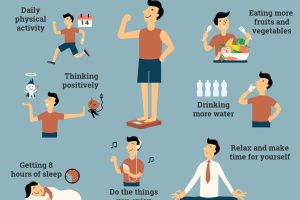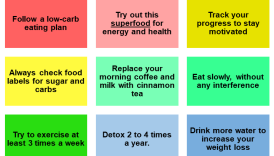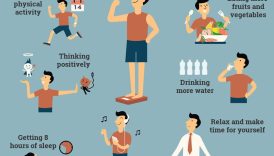10 Habits for Maintaining a Healthy and Active Lifestyle

Importance of Healthy and Active Lifestyle
Embracing a healthy and active lifestyle isn’t merely a trend; it’s a long-term investment in one’s well-being. With the ever-increasing pace of modern life, it’s easy to overlook the importance of maintaining physical health. Regular exercise and balanced nutrition serve as the foundation for improved health, energy levels, and longevity. For example, many individuals find that incorporating short walks into their daily routine helps reduce stress and boosts their mood significantly. Studies have shown that even small amounts of physical activity can make a substantial difference in one’s overall health.
- 10 Habits for Maintaining a Healthy and Active Lifestyle
- Importance of Healthy and Active Lifestyle
- Benefits of Developing Good Habits
- Exercise Regularly
- Types of Exercise
- Creating a Workout Schedule
- Balanced Diet
- Importance of Nutrient-Rich Foods
- Meal Planning and Portion Control
- Adequate Hydration
- Benefits of Drinking Water
- Hydration Tips
- Sufficient Sleep
- Sleep and Health
- Tips for Better Sleep
- Stress Management
- Effects of Stress on Health
- Stress-Relief Techniques
- Social Connections
- Importance of Socializing
- Building a Support Network
- Mental Health
- Mindfulness and Meditation
- Seeking Professional Help
- Outdoor Activities
- Benefits of Being in Nature
- Outdoor Exercise Ideas
- Goal Setting
- Setting Realistic Goals
- Tracking Progress
Benefits of Developing Good Habits
Adopting healthy habits is key to achieving a fulfilled life. Here are some of the notable benefits:
- Enhanced Physical Health: Regular exercise reduces the risk of chronic diseases.
- Mental Clarity: Good nutrition and physical activity enhance cognitive function.
- Emotional Wellness: Healthy habits can combat anxiety and depression.
By cultivating these positive habits, individuals set the stage for a vibrant, dynamic lifestyle, paving the way for a more enjoyable life experience.
Exercise Regularly
Types of Exercise
When it comes to staying active, variety is key! Engaging in different types of exercise not only prevents boredom but also ensures a well-rounded fitness routine. Here are some popular forms of exercise:
- Aerobic Exercise: Activities like running, cycling, or swimming increase your heart rate and endurance.
- Strength Training: Weightlifting or bodyweight exercises help build muscle and increase metabolism.
- Flexibility Exercises: Yoga or stretching improve flexibility and can enhance overall performance.
- Balance Training: Activities such as tai chi are great for improving balance and stability, especially as one ages.
Creating a Workout Schedule
Crafting a workout schedule can seem daunting, but it doesn’t have to be! A simple approach can yield remarkable results. Consider following these steps:
- Assess Your Goals: Determine what you want to achieve—weight loss, muscle gain, or improved endurance.
- Set a Weekly Routine: Aim for at least 150 minutes of moderate exercise each week, spread across various days. For instance:
- Monday: Aerobics (30 minutes)
- Wednesday: Strength training (30 minutes)
- Friday: Flexibility workout (30 minutes)
- Stay Consistent: Consistency is crucial, so choose a time that works best for you. After all, the best workout is the one you enjoy and can stick to!
Balanced Diet
Importance of Nutrient-Rich Foods
After establishing a regular exercise routine, the next fundamental pillar of a healthy lifestyle is maintaining a balanced diet. Nutrient-rich foods play a crucial role in fueling the body and supporting overall health. Incorporating a variety of fruits, vegetables, whole grains, lean proteins, and healthy fats ensures that your body receives essential vitamins and minerals. For example, a colorful plate full of vegetables not only looks delightful but also packs a punch of antioxidants, which can boost your immune system. Some key benefits include:
- Increased Energy Levels: Nutrient-dense foods keep your energy steady throughout the day.
- Disease Prevention: A balanced diet can lower the risk of chronic illnesses like heart disease and diabetes.
- Better Mood and Mental Clarity: Nutrients help regulate stress levels and improve cognitive function.
Meal Planning and Portion Control
Meal planning and portion control are essential strategies for maintaining a balanced diet. Here’s a simple framework to get started:
- Plan Your Meals: Dedicate a day each week to plan your meals and snacks to avoid impulsive choices.
- Portion Sizes: Use smaller plates to help control portions, which can prevent overeating.
- Healthy Snacks: Keep nutrient-dense snacks like nuts or yogurt handy to stave off hunger and avoid unhealthy options.
By being mindful of what you eat and how much, you can nourish your body effectively and stay on track with your health goals!
Adequate Hydration
Benefits of Drinking Water
Hydration is often overlooked in the quest for a healthy lifestyle, yet it plays a pivotal role in overall wellness. Drinking adequate water not only ensures proper bodily functions but also enhances physical and mental performance. For instance, during a recent workout, I noticed a significant drop in my energy levels when I hadn’t hydrated properly. Here are some of the key benefits of staying hydrated:
- Improved Physical Performance: Adequate hydration can enhance endurance and strength during exercise.
- Better Digestion: Water aids in breaking down food, ensuring better nutrient absorption.
- Enhanced Mood and Clarity: Staying hydrated helps prevent fatigue and improves focus.
Hydration Tips
To make hydration a habit, consider these practical tips:
- Keep Water Accessible: Carry a reusable water bottle to ensure you drink water throughout the day.
- Set Reminders: Use phone alerts or apps to remind you to take a sip regularly.
- Hydrate Before Meals: Drinking a glass of water before meals can aid digestion and help control portion sizes.
By actively prioritizing hydration, individuals can bolster their energy levels and enhance their overall health. Don’t forget that every little sip counts!
Sufficient Sleep
Sleep and Health
After focusing on hydration, it’s crucial not to underestimate the power of sufficient sleep on overall health. Quality sleep supports almost every bodily function, influencing everything from your mood to your immune system. Personally, I’ve noticed a stark difference in my productivity on days when I’ve had a restful night compared to nights of tossing and turning. Here’s why sleep is vital:
- Physical Recovery: Sleep allows the body to repair tissues, build muscle, and synthesize proteins.
- Mental Functioning: A good night’s sleep enhances memory, concentration, and decision-making skills.
- Emotional Well-being: Proper sleep helps regulate hormones related to stress and mood.
Tips for Better Sleep
Here are some effective strategies to improve sleep quality:
- Create a Sleep Schedule: Go to bed and wake up at the same time every day to regulate your body’s internal clock.
- Limit Screen Time: Reduce exposure to screens at least an hour before bed to encourage melatonin production.
- Design a Relaxing Bedtime Routine: Engage in calming activities like reading or meditating to prepare your mind for sleep.
By prioritizing good sleep habits, individuals can unlock more energy and enhance their overall health and well-being. Sweet dreams lead to brighter days!
Stress Management
Effects of Stress on Health
Following a good night’s sleep, it’s equally important to address another critical aspect of health—stress management. Chronic stress can wreak havoc on both mental and physical health, which I learned firsthand when my tight deadlines at work left me feeling overwhelmed and fatigued. The repercussions of prolonged stress include:
- Health Issues: Increased risk of heart problems, diabetes, and gastrointestinal issues.
- Mental Strain: Anxiety and depression can be exacerbated by ongoing stress.
- Impaired Sleep: Stress often leads to insomnia or disrupted sleep patterns, creating a vicious cycle.
Stress-Relief Techniques
To combat stress, incorporating effective stress-relief techniques into your daily routine is essential. Here are a few strategies that have worked wonders for many:
- Practice Mindfulness: Engage in mindfulness meditation or deep-breathing exercises to center yourself.
- Stay Active: Regular physical activity, such as walking or yoga, can significantly reduce stress levels.
- Connect with Others: Share your feelings with friends or family; social support can alleviate stress.
By actively managing stress, individuals can foster a healthier, more balanced lifestyle, paving the way for a happier outlook on life. Remember, it’s perfectly okay to hit pause and take a breath!
Social Connections
Importance of Socializing
After addressing stress management, let’s shift our focus to another vital aspect of a healthy lifestyle: social connections. Engaging with others not only boosts your mood but also fosters a sense of belonging. Personally, I find that spending time with friends—whether catching up over coffee or enjoying a group hike—has an immeasurable impact on my overall well-being. Research indicates that strong social ties can lead to:
- Reduced Stress: Socializing offers an outlet to share experiences and lighten burdens.
- Improved Mental Health: Regular interactions can lower feelings of loneliness and anxiety.
- Enhanced Longevity: Studies suggest that those with strong friendships tend to live longer.
Building a Support Network
Constructing a robust support network is essential for sustained happiness. Here are some effective ways to develop meaningful connections:
- Join Local Clubs or Groups: Consider participating in community activities, such as book clubs or sports teams.
- Volunteer: Helping others can create bonds and foster a sense of purpose.
- Reach Out: Make it a habit to regularly check in with old friends or acquaintances.
By nurturing social connections and establishing a support network, individuals can not only enhance their emotional resilience but also enrich their lives in countless ways. Embrace the joy of connecting with others!
Mental Health
Mindfulness and Meditation
With strong social connections established, it’s important to prioritize mental health as a key component of overall wellness. Mindfulness and meditation have emerged as powerful tools for managing stress, enhancing focus, and promoting emotional well-being. Personally, I’ve found that taking just ten minutes each morning to practice mindfulness has transformed my outlook, helping me approach the day with clarity and calm. Here’s how engaging in mindfulness can benefit mental health:
- Reduces Anxiety: Mindfulness helps create a buffer against overwhelming feelings.
- Enhances Focus: Regular practice can improve concentration and decision-making.
- Promotes Emotional Resilience: It aids in processing emotions without becoming overwhelmed.
Seeking Professional Help
While mindfulness techniques are tremendously beneficial, there are times when seeking professional help becomes essential. Don’t hesitate to reach out to a mental health professional when feeling persistently overwhelmed or struggling. Here are some signs that it may be time to seek help:
- Persistent Sadness: If feelings of sadness linger for weeks.
- Disruptive Effects on Daily Life: When anxiety or stress interferes with work or relationships.
- Unmanageable Emotions: Experiencing frequent mood swings or feelings of despair.
By combining mindfulness practices with professional support, individuals can cultivate a healthier mental landscape, enhancing their capacity to thrive in life. Prioritizing mental health is just as important as nurturing physical health—both pave the way for a more fulfilling, balanced life!
Outdoor Activities
Benefits of Being in Nature
As we focus on mental health, one of the simplest yet most effective remedies is spending time outdoors. Being in nature offers a refreshing escape from daily stressors, which I experience firsthand during my weekend hikes. The fresh air and beautiful surroundings not only uplift my spirits but also invigorate my mind. Here are some benefits of immersing yourself in nature:
- Reduced Stress: Nature exposure can lower cortisol levels, promoting relaxation.
- Improved Mood: Studies show that spending time outside can significantly enhance feelings of happiness.
- Increased Creativity: Disconnecting from technology and engaging with nature can boost creative thinking.
Outdoor Exercise Ideas
Incorporating outdoor activities into your routine can make exercise more enjoyable. Here are some fun ideas to get you started:
- Hiking: Explore local trails while enjoying nature’s beauty.
- Biking: Ride through parks or along scenic routes to combine exercise with exploration.
- Outdoor Yoga: Find a peaceful spot in a park to practice yoga and connect with nature.
- Running or Walking: Cherish the sights and sounds of your surroundings while you jog or stroll.
By embracing outdoor activities, you not only boost your physical fitness but also nurture your mental well-being. Nature offers the perfect backdrop for a healthy, active lifestyle!
Goal Setting
Setting Realistic Goals
As we embrace outdoor activities and the myriad benefits of nature, it’s essential to channel that energy into effective goal setting. Setting realistic and achievable goals empowers individuals to stay motivated and maintain their active lifestyle. Personally, I found success when I shifted my focus from vague aspirations to specific milestones—like aiming to hike every weekend. Here are some tips for setting realistic goals:
- Be Specific: Rather than saying “I’ll exercise more,” specify “I’ll walk for 30 minutes three times a week.”
- Keep it Achievable: Set goals that are challenging yet attainable to avoid frustration.
- Time-Bound: Give yourself a deadline to create urgency and motivation.
Tracking Progress
Once goals are set, tracking progress becomes crucial for staying on target. I’ve discovered that regularly checking my advancement boosts motivation and provides valuable insights. Here are effective ways to track your progress:
- Journaling: Keeping a fitness journal helps log workouts, meals, and feelings.
- Apps: Utilize fitness trackers or apps that monitor progress and set reminders.
- Regular Reviews: Set aside time weekly or monthly to evaluate your goals and adjust as necessary.
By setting realistic goals and consistently tracking progress, individuals can navigate their wellness journey with confidence, ultimately transforming aspirations into achievements. Celebrate every step—it’s a journey worth taking!





